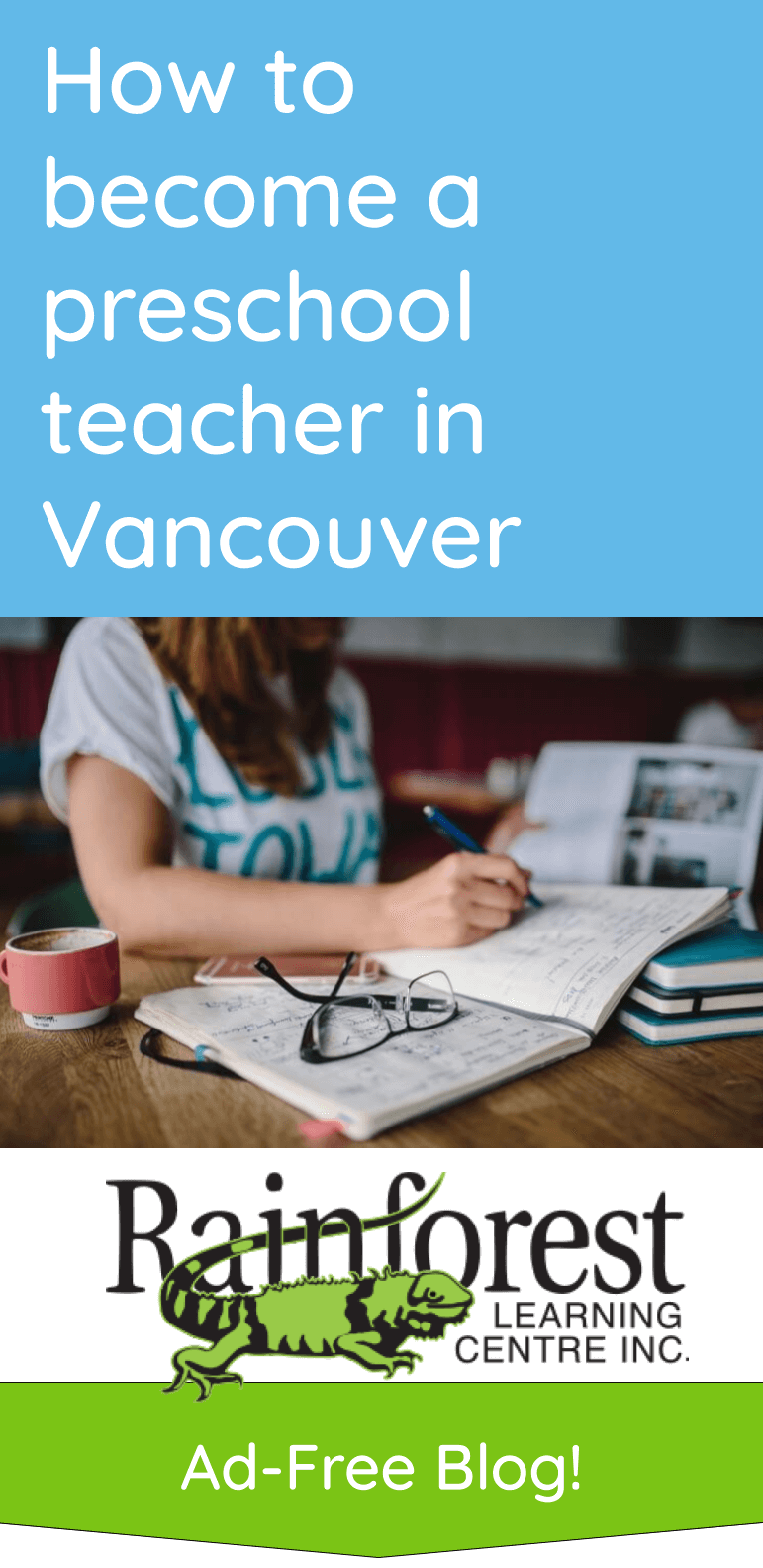
Do you love kids and making an impact on their lives? If you’re thinking about a career working with little ones, we congratulate you! Certainly those who work at our daycare centres have found joy in the profession. Below we’ll explain how to become a preschool teacher in Vancouver (meaning, the Metro Vancouver, or Lower Mainland area).
Learn about the childcare jobs and roles that you can fit into; becoming a preschool teacher can mean different things!
In B.C. and generally in Canada, a preschool teacher is referred to as an early childhood educator (‘ECE’ for short).
With the term, “preschool teacher” in mind, you may be imagining an adult standing in front of a bunch of 4-year-olds, teaching them facts and reading stories. However, the job is much more varied than that. In a community-based preschool or childcare centre, whether public or private, the roles and responsibilities of those who work in early childhood education can be different.
Some of the positions you may qualify for, whether at the beginning of your career, or later into it, are:
- Program development manager or coordinator
- Curriculum advisor
- Supervisor or manager
- Daycare owner or private child care provider, such as a nanny (see this article for important information about the types of legal child care in B.C.)
- Strong Start facilitator
- Child minding at a neighbourhood house, cruise ship, community centre, or other places in need of child care
- Parent-participant preschool facilitator, or family resource worker
- Special needs educator
- Infant caregiver
There are also other roles that complement early childhood educators in B.C. For example, there is an official, government-approved role called an early childhood educator’s assistant. Lower on the scale is something called a “Responsible Adult,” which is also a regulated credential to work in daycares. These are not the same as being a preschool teacher. They come with lesser qualifications. But they may be a fit for you, if you are looking for that type of occupation.
Higher on the scale, requiring more education, are certificates for working with special needs kids, and for working with infants and young toddlers.
Eventually you may also become a licensing officer, consultant, researcher or even a teacher to train new early childhood educators (after more education).
Practically, you may also find that, depending on where you get a job, you’ll be working in an environment with kids outside the typical ‘preschool’ age group. For example, a preschool or daycare can have infant care, and before and after school care for older kids, all in the same facility (but usually different classrooms). So, it’s possible that, within the legalities allowed for such jobs, you may be a ‘floater’ at the centre you work at.
Pick an early childhood education program at a post-secondary school that’s right for you
Becoming a preschool teacher in Vancouver requires education itself. The industry is highly regulated – it is far from a ‘just go at it’ type of job. You can’t work your way up into the position without formal education and certificates. It’s also not quite the same as getting a teaching degree, to teach in grade school.
Preschool teachers mostly instruct children as young as 3 years old, and up until about 5 years old (though, this can vary). But, as mentioned above, there are extra certificates for advancing your career. The levels of education in early childhood are:
- ECE Basic certificate
- ECE Post – Basic certificates (Infant & Toddler and/or Special Needs certificates)
- ECE Diploma
- ECE Bachelor
Each of the above builds upon the level prior to it.
Government-approved schools in the Vancouver area, where you can learn to be a preschool teacher, at varying levels, are:
- Delta School District Continuing Education (combined with Richmond School District)
- Burnaby School District Continuing Education
- Capilano University
- Douglas College
- Langara College
- University of British Columbia (UBC)
- Montessori Training Centre of BC (specific to the Montessori method, however)
Plus, the B.C. government publishes a list of private and online institutions which are also approved to train early childhood educators. These include Sprott Shaw College at their multiple locations, CDI College and Vancouver Career College. You can see a full list of accredited schools at the following link:
It may also be useful to know that you can apply for a bursary (funding grant) to study early childhood education. See here for more info.
Get certified as a preschool teacher in Vancouver (i.e. an early childhood educator)
The government must also certify all applicants, before they can work as an official, early childhood educator or assistant. If you think about it, there aren’t that many occupations requiring so much oversight. So, this is an important job to have. The government cares a lot about who we are entrusting with our young children, as a society.
In British Columbia, those who wish to become a licensed ECE apply under the Ministry of Children and Family Development. This involves a typical application process and waiting period. You can learn more about the certification process at the following link:
Keep in mind that you’ll also need to maintain your certificate!
Acquire work experience in a childcare job or related position
You’ll notice that many of the requirements to get your early childhood education certificate require practicums. So, in a way, this point actually goes before the certification application step.
However, even after getting your certificate, and before applying for a career-related job, it is important to get relevant work experience. This can be working with children in multiple ways. For example, while going to school, you may have a part time job as a nanny or baby-sitter. Or, you can try volunteering at community centres with programs for kids. Perhaps you’ve taught Sunday School at your church since you were a teen. That counts!
Of course, you’ll also need your first-aid certificate, and any emergency-planning training you can get. As a preschool teacher in Vancouver, you’ll need to help with serious tasks such as earthquake preparedness, food safety, and more. So, it would be great to show a potential employer that you have your Food Safe certificate, lifeguard training, anti-bullying course completion, or other relevant training. Even having taken a baby-sitting course in high school might win you some brownie points!
A career in early childhood education, whether as a preschool teacher or otherwise, can have many benefits. However, we believe anyone who goes into this profession should go in with full knowledge about what to expect. For that reason, we’ve written an article titled, 3 things to know before starting a career as childcare worker in Metro Vancouver, B.C.. We strongly recommend giving that a read!
See related articles on our blog:
- How early childhood educational consultants help teachers and parents
- What are government resources for early childhood care in B.C.? Starting in 2018, things have changed for the better
- How do professionals evaluate the quality of daycares and preschools?
- 6 Myths about daycare and preschool, debunked
- What does an early childhood educator do at work?
- Types of daycare in B.C. explained (plus legal vs licensed child care definitions)
